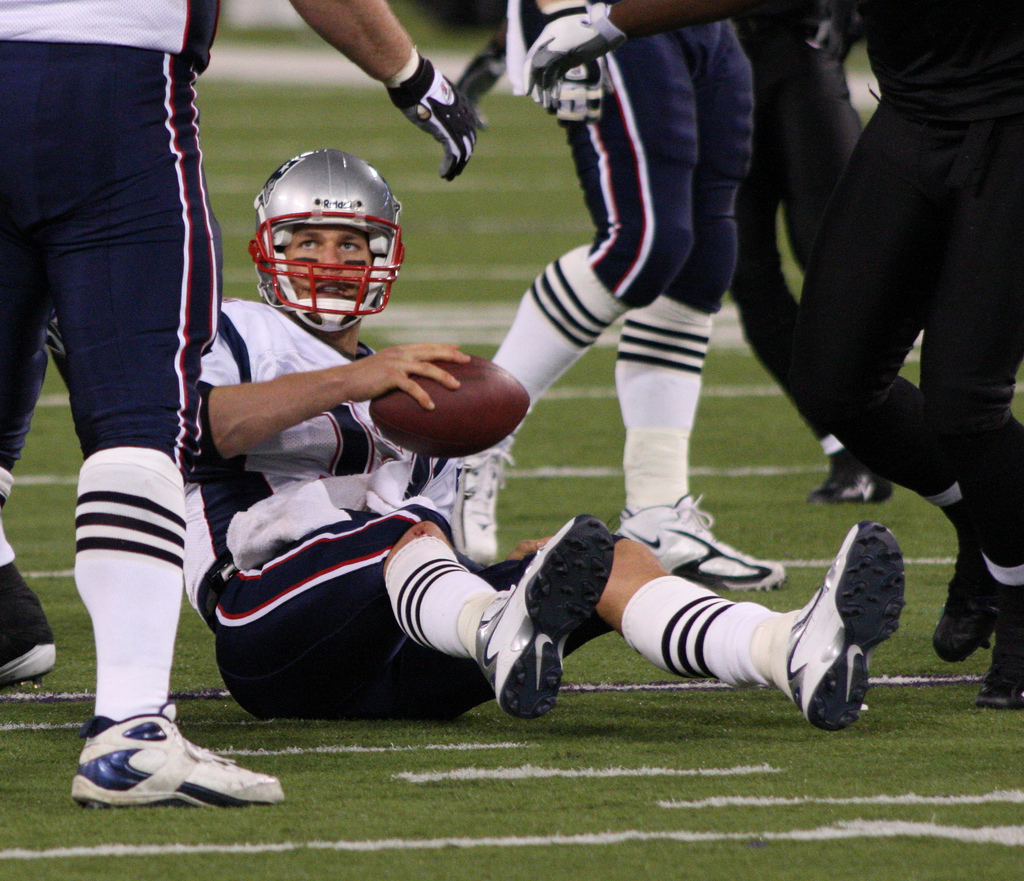As the NFL season began this past week, the man who has led the New England Patriots for a decade and a half will sit at home, unable to contact or interact with anyone on the team. The league suspended Tom Brady after he played a role in the Deflategate scandal, in which the Patriots allegedly used footballs that weren’t inflated properly to gain a competitive advantage (yes, it’s really that dumb), and many onlookers couldn’t be happier.
Hot-take artisans across the land, from Fox Sports’ Chris Chase to The Boston Globe’s Dan Shaughnessy, have argued that Brady deserved every ounce of retribution. Those provocateurs aren’t alone: NFL players past and present, such as Arizona Cardinals quarterback Carson Palmer and former gunslinger Chris Simms, have echoed their sentiments. And from my anecdotal observations, many football fans — most of whom, presumably, follow the other 31 teams — are elated at the prospect of a Brady-less Patriots squad, if only for the first quarter of the season.
Now, make no mistake — as a Baltimore Ravens fan, I abhor Tom Brady. Nothing pleases me more than the sight of that whiny fop eating turf after a vicious hit. I’d normally welcome anything that keeps him off the field and forces the Patriots to run out an inferior backup; I’d guess that most of the people celebrating Brady’s suspension feel the same way. But his absence disturbs me because of the factors at play behind it, and what it could portend for the future.
While Deflategate initially appeared to be a massive scandal for the Patriots, the evidence against them was dubious at best. Brady’s punishment, rather than reflecting his guilt, instead came as a result of his perceived insolence during the investigation. In upholding the suspension, a circuit court wrote that NFL commissioner Roger Goodell can discipline players for “conduct detrimental to the integrity of … the game of professional football” — an alarmingly open-ended definition that could harm far more than just Brady.
We saw the ramifications of Goodell’s power in August. Investigating allegations of PED use, the NFL wanted to speak with four players. They declined, probably because the allegations were bogus. In response, the league threatened to bar them indefinitely unless they opened up; eventually, the players gave in. The NFL should enforce its rules, which means issuing suspensions when warranted. But there’s a massive difference between putting a bounty on an opposing player and refusing to cooperate in a spurious investigation. When the league has amorphous regulations on whom it can sideline and for what, Goodell can continue to rattle his saber, as he did with these four players — or even use it, as he did with Brady.
At the end of the day, though, football doesn’t matter — regardless of who partakes in them, the events on the gridiron don’t affect the real world. What does matter, however, is the press. When an entire media organization goes under because one individual disagreed with what it had published, it should shock and terrify the world. Yet that hasn’t been the general reaction to Gawker’s demise at the hands of tech billionaire Peter Thiel.
Earlier this year, wrestler Hulk Hogan won his $140 million, Thiel-underwritten lawsuit against Gawker Media. The company sank into bankruptcy, forcing it to auction off its assets; Univision made the purchase and decided to shutter the company’s eponymous site. When this news broke, countless celebrities and media figures who disapproved of Gawker — including author Tucker Max, radio host Anthony Cumia, and self-declared comedian Dane Cook, among many other odious names — came together in jubilation. The site had a reputation as a universally negative force that hurt anyone it could, meaning it deserved everything that came to it.
Why did Gawker really collapse, though? Thiel would have us believe this story, that the site’s cruelty did it in. He told The New York Times’ Andrew Ross Sorkin that Gawker “bull[ied] people even when there was no connection with the public interest,” and that the results could be “very painful and paralyzing.” But this obscures Thiel’s true motives. As Gawker writers Tom Scocca and J.K. Trotter laid out in two of the site’s final posts, Thiel had long despised Gawker for its scathing reporting on the tech industry, the brunt of which he took. He pushed the Hogan lawsuit forward and worked tirelessly to exhaust Gawker’s legal fund, ensuring that the company wouldn’t recover.
As a resentful billionaire, Thiel manipulated the legal system to settle his petty grudges — and he’s not alone. Those who dance on Gawker’s grave may want to think about the precedent that Thiel’s victory could set. Just last year, the magazine Mother Jones barely withstood a similar lawsuit from homophobic mogul Frank VanderSloot, who objected to their LGBT-friendly writings. Roger Ailes is mulling over a lawsuit against New York magazine, after it exposed his horrendous history of sexism and harassment. And Melania Trump has announced her plans to sue the Daily Mail and other publications for defamation on questionable grounds; Thiel’s lawyer, Charles Harder, will represent her. The message here is clear: Don’t you laugh as Gawker goes by, for your favorite outlet may be the next to die.
The jubilation over Gawker’s closure, and over Brady’s suspension, brings to mind a certain Godwin’s Law-fulfilling poem. Goodell came for Brady, Thiel came for Gawker, and many of us have celebrated their downfall. But this only paves the way for future injustice. What happens when the system turns on someone or something important to you? Who will be left to speak out on their behalf?
Ryan Romano is a sophomore journalism major. He can be reached at tripler26@gmail.com.



